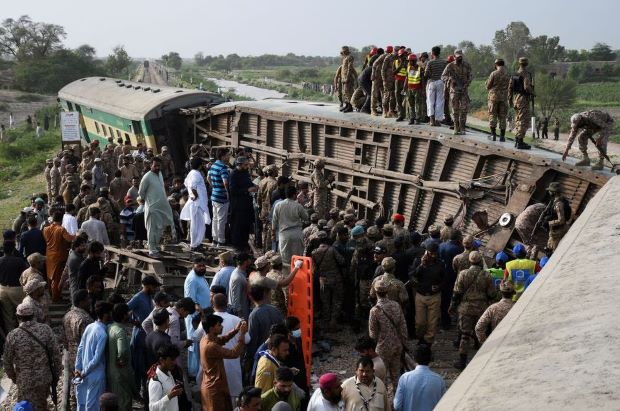Train derails in Pakistan, killing at least 30
By Salman Masood and Zia Ur Rehman
LAHORE — At least 30 people were killed and dozens of others injured Sunday (6) after an express train derailed in southern Pakistan, officials said, thrusting the dilapidated state of the country’s railway infrastructure back into the spotlight.
At least 10 carriages of the train, the Hazara Express, with at least 950 passengers onboard, fell off the tracks near the town of Nawabshah, local news media reported. The train, which left Karachi at 8:00 a.m., was heading to Havelian, in the northern part of the country.
Preliminary reports suggested that the Hazara Express had been operating at a moderate speed of 45 kilometres per hour (about 28 mph) when it derailed. Officials said the cause of the derailment could not be immediately determined.
At least 60 others were injured, officials said. Local TV networks broadcast images of crowds gathered around the derailed carriages as rescue workers tried to extricate the wounded from the mangled wreckage. Bodies pulled out of the debris were taken to a nearby hospital. Women and children were among those killed or injured.
Residents of nearby villages, including Saleh Soomro, a schoolteacher, rushed to the accident site to help injured passengers.
“I can’t find words to describe how heartbreaking the scenes were,” Soomro said. “Dozens of the passengers were trapped” in the cars, he said, adding that “blood was everywhere”.
Soomro said that residents made efforts to transport the injured to hospitals using their own resources and vehicles. “But some people, injured and dead, are still trapped inside a carriage,” he added.
Local workers, railway authorities and paramilitary troops joined the rescue efforts. The Pakistani army, following directives from its chief, Gen. Syed Asim Munir, sent troops to assist the operations, the military said.
Army helicopters were deployed to the crash site to take the wounded to nearby hospitals. Officials from the army and rangers were also distributing food to the survivors.
An emergency was declared at all hospitals in Nawabshah to accommodate the influx of injured passengers. Officials said that given the remote location of the accident, relief operations faced challenges getting to the scene quickly.
The derailment led to the closure of both inbound and outbound tracks from Karachi, and a relief train was being dispatched from Kotri to assist with the situation, said the railways minister, Khawaja Saad Rafique.
The current government’s tenure is expected to conclude Wednesday, and the railways minister said he had felt a sense of foreboding upon waking up Sunday. “I thought we only had a few days left and was anxious about a potential accident,” he said during a news briefing.
Fatal train accidents have occurred with some frequency in Pakistan as the country’s railway system continues to grapple with deteriorating rail carriages and crumbling tracks. And safety standards are dismally lacking, experts say.
Efforts over the years to revamp the country’s railway infrastructure and upgrade train carriages have met with limited success, despite repeated pledges by successive governments to improve the system.
Sunday evening, Abbas Baloch, a senior Nawabshah district official, said authorities had successfully cleared nine of 10 train carriages of the injured and the dead, and they were awaiting heavy machinery to clear the last remaining carriage.
Muhammad Shoaib, a passenger on the train, said he felt fortunate to have survived.
“I was sleeping when I felt sudden jerks,” he said from a hospital. “Thank God I am safe, but my heart is heavy with sorrow for the fellow passengers who lost their lives in the accident.”
At Karachi’s central railway station, worried relatives of the passengers on the train had gathered, seeking information about their loved ones from railway officials.
Irshad Awan, a grocery shop owner in Karachi whose relatives were traveling on the train, said such railway accidents have become frequent in Pakistan, killing hundreds of people annually.
“It is a complete failure of the government, but no one in the government cares about the killing of the poor,” Awan said.
-New York Times



Comments are closed, but trackbacks and pingbacks are open.